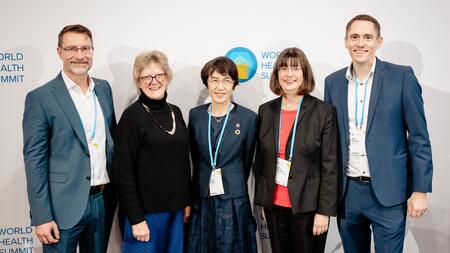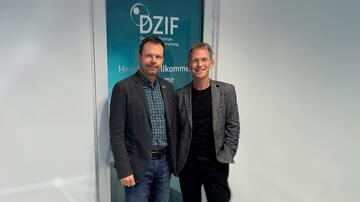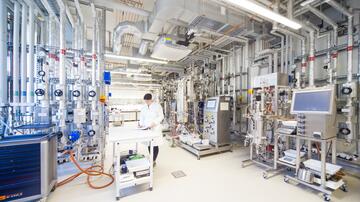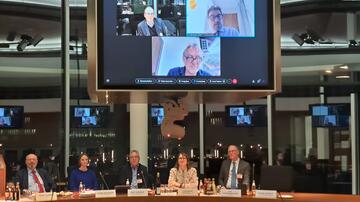World Health Summit 2025: Focus on antimicrobial resistance
The German Network Against Antimicrobial Resistance (DNAMR) held a highly acclaimed workshop at this year's World Health Summit on the topic of “Combating Antibiotic Resistance–The Role of Market Incentives in Europe for the Development of New Therapies.”
The World Health Summit (WHS), held annually in Berlin, is a key forum for international exchange on global health policy. Representatives from science, politics, business, and civil society discuss ways to achieve sustainable and equitable healthcare worldwide. As part of this year's summit, a workshop organized by the German Network Against Antimicrobial Resistance (DNAMR) focused on the political and economic dimensions of antibiotic resistance.
Under the title “Combating Antibiotic Resistance—The Role of Market Incentives in Europe for the Development of New Therapies,” Mathias Pletz, DZIF scientist and Director of the Institute of Infectious Diseases and Infection Control at Jena University Hospital, Dame Sally Davies, Special Envoy on Antimicrobial Resistance from the UK, Dagmar Reitenbach from the German Federal Ministry of Health (BMG), and Takuko Sawada, Director and Vice President of of the Board of Shionogi & Co., Ltd. from Japan, discussed strategies for how appropriate market incentives can advance the development of new antimicrobial therapies in Europe.
Marc Gitzinger, CEO and founder of BioVersys from Switzerland, opened and moderated the workshop with an urgent appeal: While the threat posed by multi-resistant bacteria is growing, the development of new antibiotics is stagnating. “Humanity is in danger of falling back into the era before the discovery of penicillin,” said Gitzinger. The burden of antibiotic development lies largely on the shoulders of small companies, as large pharmaceutical companies are increasingly withdrawing. Incentive systems are urgently needed.
Antibiotic development must be considered critical infrastructure and promoted
Dame Sally Davies called for a fundamental rethink of how antibiotics are evaluated, describing them as “critical infrastructure.” She presented the British subscription model—known as the “Netflix” model—a tiered, decoupled payment system in which companies are remunerated based on the estimated value of their antibiotic to the National Health Service and patients, rather than on sales volume. With up to £23.7 million per year for breakthrough innovations over a maximum period of 16 years, the model aims to drive innovation while promoting responsible use. She emphasized the need for international cooperation and leadership—particularly within the G7, the EU, and the G20—to scale up best practices, and called for investment from “universal owners” such as pension funds, industry, and other partners to address this societal challenge.
Germany supports the introduction of Transferable Exclusivity Vouchers (TEVs)
Dagmar Reitenbach delivered important news at the EU level: As part of the pharmaceutical package, Germany supports the introduction of Transferable Exclusivity Vouchers (TEVs) in the version of the Council mandate as part of the EU pharma package, i.e., an instrument that provides a positive market incentive while remaining financially viable. At the national level, Reitenbach also presented the German measures: AMR ambassador, push and pull incentives, including preferential treatment in the benefit assessment procedure for innovative antibiotics and free pricing since 2023 to make pricing for reserve antibiotics more flexible. In addition, Germany supports international public-private partnerships such as GARDP and CARB-X, as well as initiatives such as the Global AMR R&D Hub.
Mathias Pletz made it clear that despite stewardship, new antibiotics are constantly needed because bacteria naturally develop resistance. An impressive video illustrated this evolutionary process. Pletz also pointed to the significant increase in antibiotic resistance in Germany as a result of the war in Ukraine and emphasized the security policy dimension of the issue.
Takuko Sawada underscored her company's social responsibility: “We provide active ingredients free of charge, but of course we also have economic constraints to consider.” Sawada showed great interest in developments in the UK and the discussion on TEVs at the EU level to support innovative approaches to sustainable antibiotic development.
Source: News of the DNAMR (german only)




